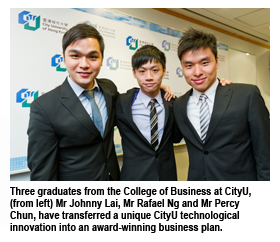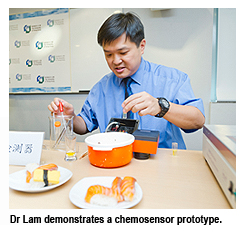CityU promotes knowledge transfer for unique food testing technology
Mirror Fung
?
Three graduates from the College of Business at City University of Hong Kong (CityU) have developed an award-winning business plan for instantly testing food for freshness and quality. Their innovative business plan highlights the University’s strengths in transferring technology to the market for the benefit of society.
The graduates from the College of Business at CityU—Mr Johnny Lai Wai-fung, Mr Rafael Ng Hoi-wai, and Mr Percy Chung Sai-yau—outperformed more than 400 teams to win the Investors Choice in the 80s Dream Competition organised by Commercial Radio in Hong Kong with a business plan that uses a unique technology developed and patented by Dr Michael Lam Hon-wah, Associate Professor in the Department of Biology and Chemistry at CityU, and CityU alumnus Dr Chow Cheuk-fai.
The trio of students marketed the technology developed by Dr Lam and his team through MoniQ Technology Company Limited that they founded in April 2012. They targeted the restaurant sector, giving demonstrations of the innovative technology, which is known as a chemosensor.
CityU and MoniQ are holding talks on licensing the technology to MoniQ
and a sushi restaurant chain is now considering installing these chemosensors in all its branches.Chemosensing is a means of detecting biogenic amines, highly volatile nitrogenous compounds produced as a result of protein degradation in food that is going rotten. These bacteria are harmful if they are present in food because the food might taste and smell normal, according to Dr Lam, the mastermind behind the patented technology, but they can make you sick. Detecting their presence in frozen food has also been hard in the past before the introduction of the chemosensing technology.
“The chemosensing technology is based on molecular ensemble theory and the chemosensor is designed to detect specific odours. If the amount of biogenic amine exceeds safety levels, a warning signal is triggered,” Dr Lam explained.
“We can monitor food quality standards and ensure food safety in a quick and easy way using this new technology, which has been tested in the laboratories over the years with state-of-the-art equipment, scientific expertise and trained technicians,” he added.
The three young graduates quickly saw the market potential of the chemosensing technology and decided to form a team to join the 80s Dream Competition.
“We conducted market research and a market analysis, together with a financial plan, to come up with a business proposal, putting into practice what we had learnt in business school at CityU,” Mr Chung said.
Their well-researched business plan was favourably reviewed by the judges and was one of the two winners named as the Investors Choice.
“We have learnt a great deal about looking for investors, manufacturing partners and potential customers. We had to keep fine-tuning our business plan based on the invaluable feedback from our contacts,” Mr Lai said.
“Some people had been saying that chemosensors might drive restaurant patrons away but we have never doubted the market potential of the technology that CityU has helped to transfer to society,” he added.

